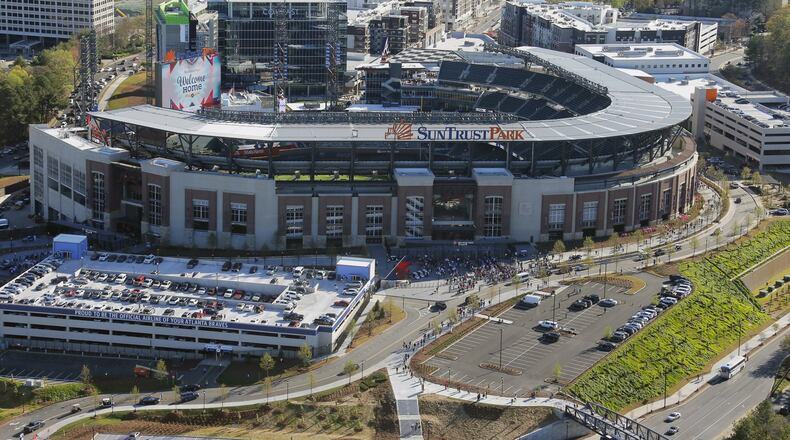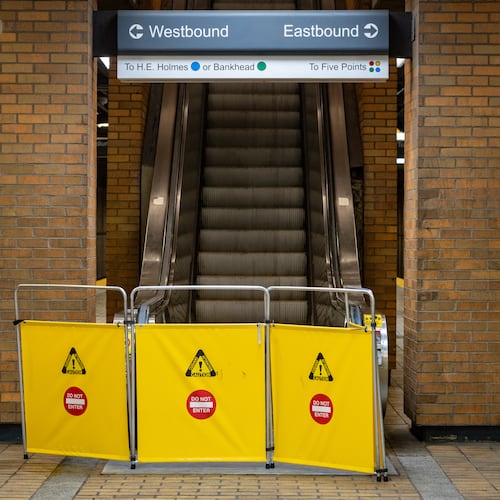A year and a half after the first pitch at SunTrust Park, Cobb has yet to account for tens of millions of dollars in stadium construction work and officials haven’t independently confirmed a final price tag on the county’s largest, most controversial public works project.
The seeming lack of interest in tracking the true cost of a county-owned asset built with massive public investment reflects what some see as a lack of basic oversight by Cobb officials.
The Braves, who managed the stadium construction, say at $684 million, the ballpark exceeded its budget, with the team covering more than its share. But Cobb only has invoices covering $536 million, meaning there are roughly $148 million in construction costs for which Cobb officials have not reviewed receipts.
“We have invoices for all work that was the county’s responsibility to pay for,” the county said in a statement.
Determining the stadium’s final cost and the percentage paid by the county and the Braves is vital to understanding taxpayers’ role in a project touted as a win-win partnership when officials announced it five years ago.
The contract inked with the Braves stipulates that if the project came under budget, the savings may be applied toward “mutually agreed upon” stadium improvements or a capital maintenance fund — both expenses that taxpayers must help cover.
The lack of a clear accounting means the county is at a disadvantage to verify if there were any savings and hampers public scrutiny of what the Braves claimed as a stadium expense.
Cobb Chairman Mike Boyce said the remaining invoices don’t matter because Cobb’s contribution to the stadium is fixed and it won’t change, regardless of the final tally for construction.
In 2016, Boyce rode a wave of voter discontent over the stadium deal to defeat former chairman Tim Lee. Part of his platform was a call for greater transparency with regards the ballpark. Boyce now dismisses concerns over the county’s book-keeping, saying he has no leverage anyway to compel the Braves to provide more documentation.
A provision in the contract allows either side to audit the project.
“We’ve paid our bills,” Boyce said. “Both sides are now in agreement that we have fulfilled all our obligations.”
Ongoing costs at SunTrust Park and who pays for them are hardly a settled matter. In September, the county and the Braves resolved a legal dispute over $1.5 million in sewer infrastructure. Previously, the Braves successfully argued that certain road improvements around the ballpark did not count toward the county's $14 million stadium transportation obligation, forcing Cobb to dip into its water fund to reimburse the team.
No ‘pointed questions’
In statements to the public as recently as this year, Braves and county officials have consistently emphasized that the team was paying the lion’s share of the ballpark construction, budgeted at $672 million.
Those figures were always potentially misleading. In fact, the development agreement the county signed in May 2014 put the stadium budget at $622 million, with the Braves kicking in another $50 million in “discretionary” funds if they wanted.
Public funds accounted for $392 million of the up-front costs, in addition to $35 million in capital maintenance over 30 years. The Braves were obligated to pay at least $230 million in construction costs on the front end, and will reimburse Cobb an estimated $92 million through rent payments over the next three decades. The team was also responsible for any cost overruns.
But the Braves were in control of much of the planning and construction, placing the onus on the county to watch-dog the actual costs.
Commissioner Lisa Cupid, who has been a consistent skeptic of the Braves deal, said there is little appetite on the board to damage the relationship with the team by asking “pointed questions.”
As a result, she doesn’t believe the taxpayers are being protected as they should be.
“Throughout this time, there has been no record or documents forwarded to the board on a regular or periodic basis to show how these things are being accounted for,” Cupid said. “There have been other costs above and beyond what the county has said our contribution should be.”
The county’s most recent summary of stadium invoices, updated in June, totals just $536 million for stadium construction costs. Of that, $155 million is identified as having been paid by the Braves.
A line item on the summary lists another $95 million as coming from Braves “outside” construction accounts, but there are no details about these charges and Cobb has not received invoices for those billings, county officials said.
In response to the AJC’s questions for this story, Greg Heller, the Brave’s executive vice president and chief legal officer, told the county’s legal department that the team has spent $292 million on the stadium.
“All payments by the Braves were made in accordance with the terms of the Development Agreement, which permitted direct payments of invoices,” he wrote in an email.
Assessing stadium impact
Despite Cobb's incomplete accounting of the project, some county officials have been quick to tout the economic benefits of the ballpark, citing a study released in September by the Center for Economic Development Research at Georgia Tech.
Funded by the county’s chamber of commerce and unveiled at the Battery, the study predicts the stadium complex will have a positive fiscal impact to the county government and the school system. It estimates the Cobb government will take in an average of $4 million a year over expenses, and the school system will reap another $14.9 million a year over the next 20 years.
The study’s predictions are largely based on projected revenue from rising property values in the area and the Braves’ mixed-used development, The Battery. Without that development, the stadium itself has a negative impact on the county finances, the report concludes.
“[T]hat is why The Battery impact is so important,” the study’s author, Alfie Meek, wrote in an email. “You simply can’t use the old ‘traditional wisdom’ for stadium financing for this deal.”
But J.C. Bradbury, a sports economist at Kennesaw State University who reviewed the study, expressed skepticism about its findings.
“This is just ripe for cherry picking,” Bradbury said. “The halo effect is way overstated.”
He also pointed to Meek’s role in assessing a public-private partnership between the Braves and another metro county.
Ten years ago, Meek was the economist for Gwinnett County when it agreed to finance a new $64 million stadium for the Braves’ triple-A minor league team. The deal was bolstered by Meek’s analysis that the ballpark would generate $15 million a year in new economic activity.
A decade later, the Gwinnett stadium struggles to attract fans and hasn’t sparked the explosion of development taxpayers were promised.
Meek said he stands by both stadium studies.
‘This is public money’
The extent of the stadium’s influence on Cobb’s rising property values is subject to debate. But by any measure, the project has been costly to the Cobb government’s bottom line.
According to the county’s most recent analysis, Cobb spent about $18 million on SunTrust Park in the 2017 fiscal year, including $6.4 million out of its general fund property taxes and $11 million from other taxes and fees.
The revenue directly generated by the project didn’t come close to covering the county’s expenses. The Battery complex brought in $404,000 in property taxes and the Braves paid $3 million in stadium rent to the county. The ballpark also generated $1.6 million in county sales tax, but those funds can’t be used to pay down the debt because they are earmarked for education and transportation.
In an attempt to off-set some of the unforeseen costs, including $840,000 in police overtime, commissioners recently amended the Cumberland hotel/motel tax to divert more money for public safety around SunTrust Park—money that would have otherwise gone to fund the Cumberland circulator, stadium debt service or promoting Cobb tourism.
This year, Cobb’s stadium debt service and capital maintenance contributions increased, as did rent payments from the Braves.
Larry Savage, a Cobb resident who has filed several unsuccessful legal challenges to the stadium deal, sees Cobb’s failure to provide an accurate, durable accounting of total project costs is indicative of the way the ballpark has been handled from the beginning.
“The whole thing is just misinformed and a very one-sided deal,” Savage said. “This is public money and they’re supposed to be accountable for it.”
About the Author
Keep Reading
The Latest
Featured



